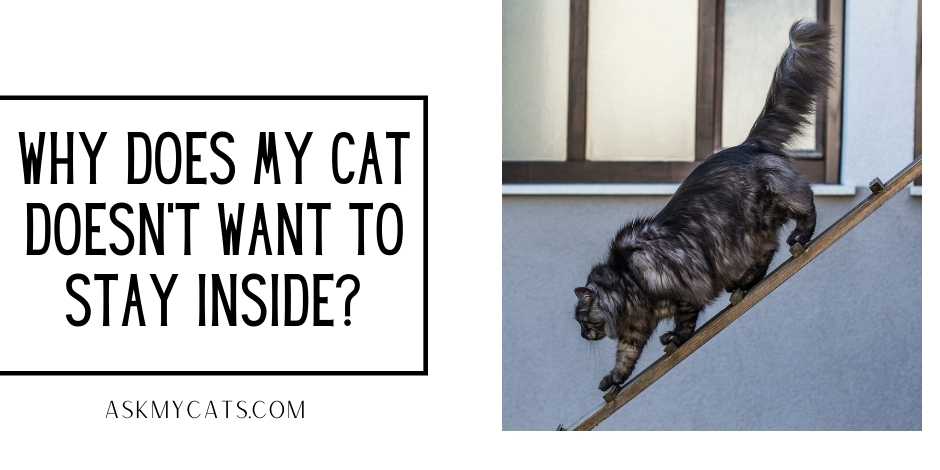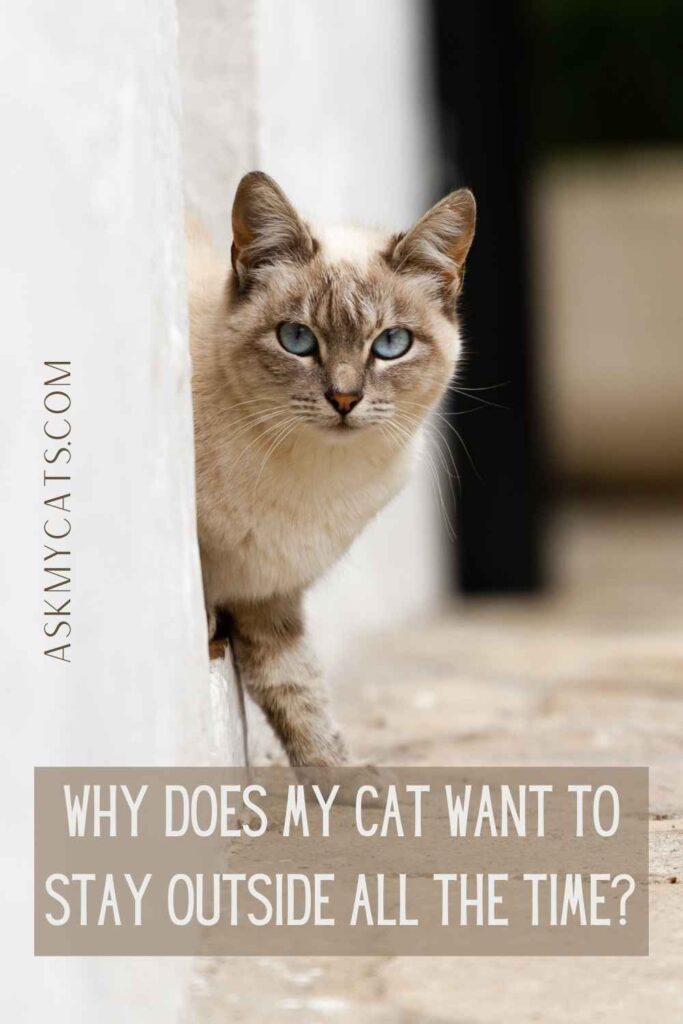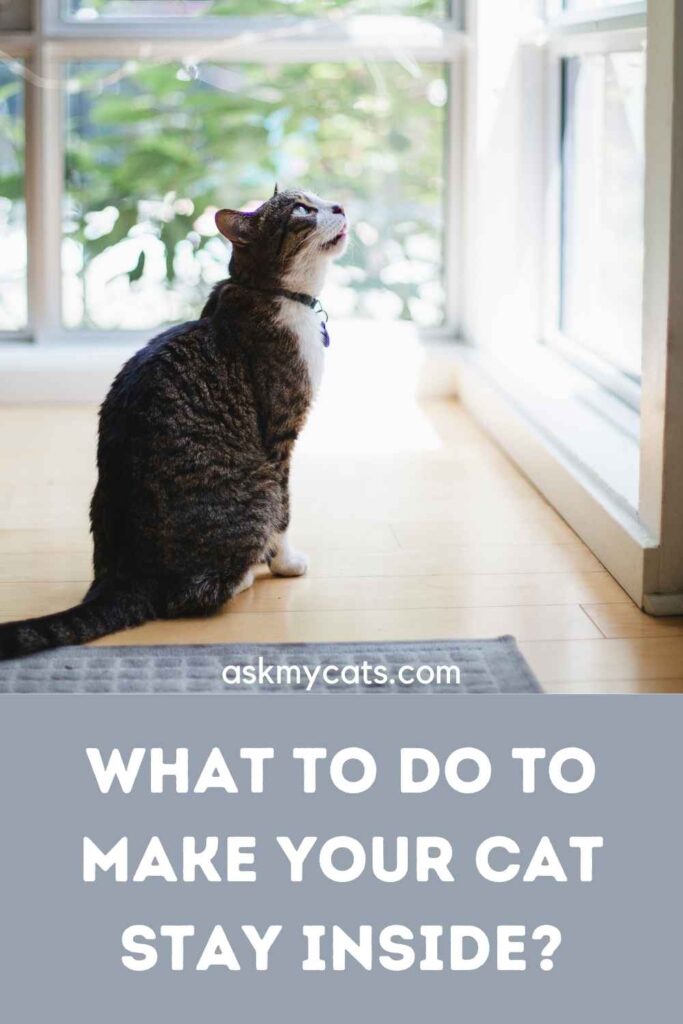A very popular reason cats unexpectedly refuse to come inside is that they’re worried about anything outside and another cat is the most famous cause.
There may well be a shift in the neighborhood’s cat behavior, and she’s concerned about this.
It’s a problem of behavior. It is not unusual for cats, in which they suddenly go into the place they previously knew well for what may not seem to be a legitimate cause.


Give Your Cat the Perfect Day
Get the Free Ebook!
Why Does My Indoor Cat Want To Go Outside?
She’s worried about something either inside or, believe it or not, outside the building. Smells and sounds are very important to cats.
In fact, pay attention to the smell. Odour is important to cats because it not only helps them recognize objects (food, prey, other cats, humans), but it also affects their mood.
The reason for this is that she is worried about something in the house or, believe it or not, outside. You might be sure of what it is if it is something inside your house… Something may have changed.
A new pet or person can be as plain as a new doorbell, or it can be as subtle as a shift in a piece of furniture.
Cats are very set in their ways and dislike change, but when something does change, they become wary and keep their distance.
However, one of the most important reasons for cats refusing to come inside is that something is bothering them outside.
Another cat is the most famous explanation. It’s possible that there’s a shift in cat behavior in the neighborhood, and she’s concerned.
As a result, she prefers to remain outside, where she believes she can better handle the situation. She’ll be stuck on the inside.
You do not realize it if your hissing problem is caused by another cat (or even a nearby wild animal). Remember that cats detect the existence of another cat even sooner than humans do.
Other cats are listed as a potential explanation based solely on chance. This is by far the most popular reason we see for such conduct.
Of course, I’m not familiar with your local climate, so this may be incorrect. But I can tell you that her insecurity and fear of the house are going to be an anxiety issue.
As a result, you must be cautious not to exacerbate your fear, otherwise, the situation will worsen. Trapping and imprisoning her could cause her problems.
Cats are cunning, and she’ll soon figure out how to get out of the pit and become suspicious.
Similarly, confining her in the house might make her afraid of it. I recognize that failing to do so will seem as though you are caving in and allowing her to get her way. It’s preferable, though, if she returns because she wants to.
You might also be wondering why has my cat started staying out all night
Why Does My Cat Want To Stay Outside All The Time?
If he’s naturally optimistic and interested, he’ll want to see what’s outside the fence.
A cat’s need to go outside is normal that is, after all, their natural environment. Most cats would prefer to be indoor/outdoor cats if they had the choice, wandering in nature when they feel curious and returning indoors when they want to be warm and healthy.

It’s also natural (though less common) for a mature cat to want to go out for the first time.
For many years, my friend’s cat took little interest in the outside world. She’s recently been intrigued, and she wants to broaden her territory.
Allowing your cat to fulfill his wish could or might not be a choice.
Whether or not it is possible for cats to outdoors depend on where you live. It is protected in some countries and territories, but not in others.
Allow your cat to wander freely if you live in an environment with few predators and lots of natural areas for him to explore.
It’s safer to keep your pet indoors if you live on a busy high-speed high-traffic road or in an environment where coyotes prey on cats.
(Be mindful that some people are adamant that “all cats anywhere must always be kept indoors, anything else is animal cruelty” or “all cats anywhere must always be let out, and anything else is animal cruelty.”)
Don’t get bothered by the zealots. They are well-intentioned, but they are unaware that working environments are not the same anywhere. Concentrate solely on the circumstances in your area and what is better for your cat.)
If it isn’t possible for him to go out, but he insists on doing so, expect escape attempts. He could even be effective! If he does a Houdini, you can get him microchipped and give him a tag with his name and phone number on it.
Consider putting him on a leash and teaching him to walk on it. Many domestic cats love walking with their owners. This encourages them to enjoy nature, the light, and the wind without being preyed upon by cars or coyotes.
Why Does My Cat Only Come Home For Food?
He may simply be stalking and doing what cats do and returns because he knows where his house is and where he is fed.

Some kittens will develop out of their cuddly period when they mature, while others will not.
My 5-year-old cat goes outside in the mornings and does not return when called.
He comes in several times a day, feeds, drinks, and then leaves. He returns at 8:00 p.m. He is reachable by phone and sleeps in the house at night.
My boyfriend claims Grayson has been fleeing him and refusing to come in at night for the past week (I have not been at home), but does come in at 6:00 a.m. when he feeds the outside cats. As a result, cat activity is difficult to decipher.
Don’t make him go the next time he drops in to eat. He won’t be pleased about it, so hold him indoors or he may not come home one day.
I don’t recall whether you mentioned your neighborhood or not. It is dangerous for him to be walking around in a suburban neighborhood with cars and other dangers.
Have you considered adopting a second cat to keep him company?
He might be lonely, particularly if you don’t spend the whole day with him. If you should plan to get him a playmate, I recommend a spayed female around his size.
I don’t have to think too much about Grayson because we live in a very remote area on 5 acres that are fenced.
He prefers to spend his time in the garden or roaming the property with the other cats. Cat behavior is difficult to understand, as I previously said.
Any time I think I’ve worked out one of them, they turn around and do the exact opposite. Can you have any idea where he’ll end up? He may have found a playmate if any cats like children.
My other cat, Kitty Baby, is almost nine years old and has lived with a friend since he was a year old. Both morning and evening, he comes home to eat.
He doesn’t seem to like being with the other cats, but his neighbor doesn’t seem to mind. I send him to the veterinarian for his rabies injection, annual check-up, and a flea treatment.
He’s a sweet cat who gets along with the other cats but prefers not to be around them. I wish I could give you a better answer, but I’m afraid I won’t be able to. There’s no way to see into their fuzzy little heads to see what they’re thinking.
Can An Outdoor Cat Become An Indoor Cat?
You should create a healthy and relaxing atmosphere for your pet cat by meeting his or her physical and emotional needs to make the transition from an outdoor to an indoor cat.
Cats, after being domesticated thousands of years ago, still exhibit much of their wild ancestors’ habits. These delightful habits can be acted out in the comfort of your own home.
A paper grocery bag, your loving personality, and your cat’s vibrant imagination will go a long way toward keeping you and your cat healthy and young at heart.
If your indoor cat is scratching your sofa or not using the litter box, think twice before releasing him or her into the wild.
Check with the veterinarian to see if there are any medical issues that may be behind the problem behaviors.
Act with your veterinarian, a therapist, or an animal behavior expert who employs constructive reinforcement methods whether your pet receives a clean bill of health.
From your cat’s perspective, there is still a justification behind what you deem to be bad conduct. He is not behaving out of vengeance or malice.
Patience and patience, rather than discipline, are the most effective ways to re-establish your cat’s healthy behaviors.
What To Do To Make Your Cat Stay Inside?
You have to reduce his anxiety first to make him stay inside.
Of course, if there is an apparent shift that may have exacerbated all of this that is under your reach and simple to correct, that is the place to start.
However, the odds are that you just don’t know what the issue is or that it is beyond your power. As a result, we need to calm her down.
Both the laser pen and the food are effective strategies. This is referred to as diversion therapy.

Feed her somewhere outside that she recognizes as healthy, and then progressively bring the food bowl closer to the door….and then inside after a few days.
But the real trick is to avoid “punishing” her (in her mind) by slamming the door shut behind her.
If you live in the same suburbs as me (Melbourne, Australia), you’ll know that it’s not a safe idea for cats to be outdoors at night for social, environmental, or fitness purposes, so remember to do this training during the day.
You’ll have to keep the door shut for her defense if nothing else when she comes in for her evening meal (hopefully).
Now is the time to work on lowering her anxiety (regardless of what is the problem).
First and foremost, you must not display any signs of rage, despair, or annoyance, since she can detect these emotions in you. Two drugs have been shown to be very helpful in mitigating anxiety in cats. Feliway is the first.
This medication can be found on the internet, at pet stores, and through veterinarians. It’s a spray of cat pheromones in it.
These chemicals are produced by specialized chin glands in cats. They will rub their chins on various household items, essentially designating these areas as “protected zones.” You can recall the odor has the ability to influence a cat’s mood.
As a result, you will use the Feliway to designate your residence as such. Anxiety is lessened as a result of this. The substance is odorless and suitable for humans.
Clomicalm is the other product. This is a specific anti-anxiety drug for this problem. If the condition continues, you might continue to take prescription drugs. To have it, you’d have to go to the veterinarian.
How To Train A Cat To Stay Inside?
It is possible to transform a free-roaming cat into a healthy cat, but it takes time, effort, and determination. The trick is to steadily transition from the outdoors to the indoors before the new way of living becomes second nature.
Many cats will adapt with little effort, although others will express their dissatisfaction. They may itch, claw, yowl, and attempt to dash through open doors.
If your cat has never used a scratching post or a litter box, add these things to your cat long before bringing him inside. Start feeding your cat inside if you’ve been feeding him outside.
Then, rather than letting the cat out as soon as he finishes feeding, hold him indoors for longer and longer periods of time.
Some members of the household may need to be “retrained” to shut doors quickly to give their feline companion more stimulation. Playing with the cat is a perfect way for him to stay in shape both mentally and physically.
Any retired free-roamers would love it if you have “kitty greens” instead of houseplants for them to eat.
Frequently Asked Questions
Why does my cat suddenly want to be outside all the time?
Every abrupt shift in behavior (such as meowing to go outside more frequently) should be investigated by a veterinarian to rule out physiological problems before thinking the problem is behavioral. However, after your cat has been given a clean bill of health, you should start working with him on improving his habits.
Why does my cat keep meowing to go outside?
Meowing is the cat’s main method of communicating with you. She’ll also learn to meow at the door if she needs to go outside. Similarly, if she’s outside and wants in, she’ll meow for you to let her in.
Final Words
When introducing cats to the outside for the first time, it’s important that they are watched and felt secure.
Adult indoor cats can adapt to outdoor cats in a variety of ways, but they should be watched during their first few outdoor visits. New smells would most certainly confuse them.
Keep asking your questions in the comments section below!
